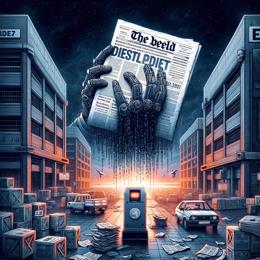Image created by AI
Dr Iqbal Survé Advocates for African Media Empowerment in Belt and Road Initiative
Amid a pivotal convergence of global leaders at the Belt and Road 3rd Council Meeting held in Chengdu on August 28, 2024, Dr Iqbal Survé, the Executive Chairman of Independent Media, put forth a compelling vision aimed at reshaping media cooperation within the expansive Belt and Road Initiative (BRI). His thoughts elaborated on the significance of media in sculpting the international discourse, particularly for Africa's growing prominence in the arena of global development.
Survé emphasized the transformative capacity of the BRI – extending beyond infrastructural advancements to become a conduit for shared development and intercontinental solidarity. In his plea for media's vital role, the notion was clear: media houses are to act as guardians of diverse narratives, helping to define the world's understanding of regions, cultures, and geopolitical shifts.
Delving into more contentious topics, Survé candidly critiqued the existing global media landscape. He pointed out the Western dominance over African media channels, implying that a genuine democracy-building front concealed deeper imperialistic ambitions. The controversy is palpable as he names players like the National Endowment for Democracy (NED), suggesting their narrative molding serves founders' interests over those of African sovereignty.
Particularly noteworthy was Survé’s endorsement of the Belt and Road News Network (BRNN). In his view, this coalition represents a fortified stance against monopolistic narratives, handing the pen back to African storytellers to convey an undiluted account of their continent.
The speech also recognized the concrete benefits already experienced by South Africa through BRI engagement - highlighting substantial investments infusing vitality into pivotal economic sectors, fostering employment, and propelling self-sustained development.
Yet, for Survé, narrative control remains paramount. He posits the vital nature of truly independent networks as instruments to resist Western narrative imposition, advocating for media that embody the BRI's essence of openness and mutual progress.
In line with the Belt and Road Media Cooperation: Chengdu Initiative, Survé's oration embraced the aspiration of collaborative media ventures to propagate sound, impartial information. His advocacy suggested that equitable BRI representation could combat prevalent biases and misinformation.
Conclusively, Survé's discourse at the Belt and Road assembly outlined not only an ambitious outline for the present. It was a strategic map for prospective media in Africa and beyond—a merge of the Silk Road's spirit with present-day technological and communicative advancements to weave an inclusive, multi-faceted global tapestry echoing fairness and diverse human experience.










